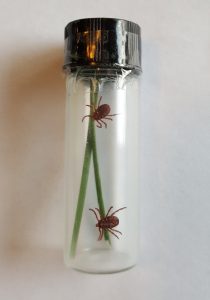
SHARE THIS ARTICLE:
NIH Grants 1.9 Million for Vaccine to Prevent Lyme
 West Virginia University researchers received a $1.9 million grant from the National Institute of Allergy and Infectious Diseases, an institution of the National Institute of Health (NIH), for a vaccine to prevent humans from contracting Lyme disease.
West Virginia University researchers received a $1.9 million grant from the National Institute of Allergy and Infectious Diseases, an institution of the National Institute of Health (NIH), for a vaccine to prevent humans from contracting Lyme disease.
Mariette Barbier, assistant professor in the School of Medicine’s Department of Microbiology, Immunology and Cell Biology, is leading the five-year project, along with Timothy Driscoll, assistant professor of biology in the Eberly College of Arts and Sciences, and Heath Damron, assistant professor and director of the WVU Vaccine Development Center.
Barbier and her team will try to develop a vaccine effective against the various species of Borrelia (the Lyme disease bacteria). They will be using RNA sequencing to examine how pathogens respond in both infected ticks and mice, and identify relevant antigens during infection.
Driscoll will be studying the proteins made by Borrelia during the black-legged ticks life cycle. “In vaccine development, what we try to do is identify those proteins and target them in hopes of clearing the pathogen out, killing it, essentially. If a protein is essential for survival, it makes it harder for the pathogen to change it and evade the immune system,” says Driscoll.
Barbier has studied bacterial pathogens, including Pseudomonas aeruginosa, which requires iron to grow and infect their host. “We figured out which antigens could be used to formulate a vaccine, and found the Achilles heel to the bacteria to use against it,” Barbier said. “We focused on one system, which is the iron acquisition system of Pseudomonas.” Since Borrelia does not require iron, she is driven to find what would be required of Borrelia.
Barbier said. “If it doesn’t use iron, what else can we use against it? By bringing in the expertise of others, we’re going to crack the problem.”
Read more about the project here (eurekalert.org)
Click here for Project Info on NIH site
Read about another recent NIH-funded Lyme Vaccine study here





